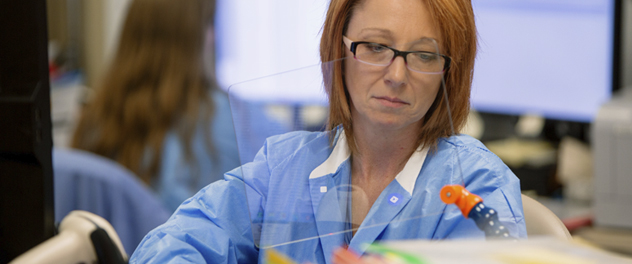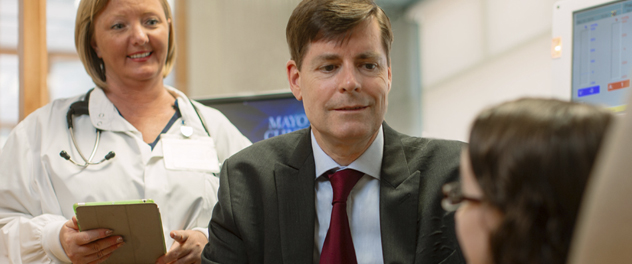-

Collaboration-driven nephrology research
The Mayo Nephrology Collaborative Group facilitates an open exchange of ideas and research on new treatments for patients with autoimmune kidney diseases.
-

New treatments for patients with kidney disease
The Mayo Nephrology Collaborative Group conducts rigorous testing of novel pharmaceutical agents to develop promising new medications for patients with glomerular diseases.
-

Translational kidney disease research
The Mayo Nephrology Collaborative Group's goal is to translate research to the clinical setting, bringing new discoveries from the bench to the bedside to improve patient care.
-

Nationwide nephrology clinical trials
The Mayo Nephrology Collaborative Group's extensive national network allows it to enroll participants across North America in multicenter clinical trials.
-

Advancing care by sharing knowledge
The Mayo Nephrology Collaborative Group disseminates its findings to help kidney specialists at Mayo Clinic and across the country stay up to date on nephrology research and clinical trials.
Overview
The Mayo Nephrology Collaborative Group is a consortium of nephrologists from Mayo Clinic's campuses in Phoenix/Scottsdale, Arizona; Jacksonville, Florida; Rochester, Minnesota; and clinical and academic nephrologists located across the United States. The group provides a venue to keep nephrologists well-informed of prospective and ongoing clinical trials and to encourage open exchange of ideas and potential new therapies aimed at treating patients with renal parenchymal diseases.
Established in 1988 by James V. Donadio Jr., M.D., and collaborators, the consortium has grown to involve the participation of more than 35 physicians in 19 states. Many of their patients with parenchymal renal diseases are early in the course of illness, at a time when promising new therapies may exert their greatest influence.
Recent developments in biotechnology have resulted in the availability of a significant number of new and very promising agents that may be beneficial to patients with renal parenchymal diseases. Research by the Mayo Nephrology Collaborative Group is crucial for developing these agents into new therapies for patients, including medications currently undergoing testing in clinical trials.
The Mayo Nephrology Collaborative Group's work leads to the rapid diffusion of new discoveries because of the number of practices it comprises. Members of the Mayo Nephrology Collaborative Group believe strongly that clinical research goes hand in hand with their roles as clinicians and educators.
Within Mayo Clinic and beyond, the clinical research conducted by the Mayo Nephrology Collaborative Group has contributed a number of important translational studies that have resulted in better patient care. Additionally, the group serves as an educator to the nephrology community worldwide through its publications.
 A nationwide nephrology research network
A nationwide nephrology research network
The Mayo Nephrology Collaborative Group's network of participating clinicians has grown to include 38 practices in 19 states, allowing it to rapidly disseminate new ideas and discoveries in kidney disease research.